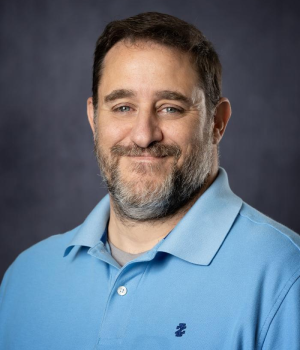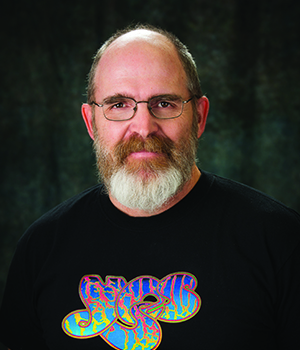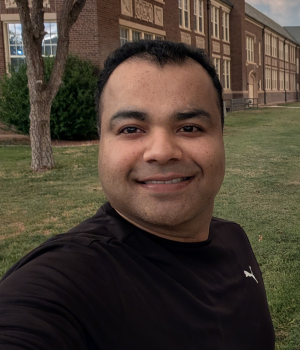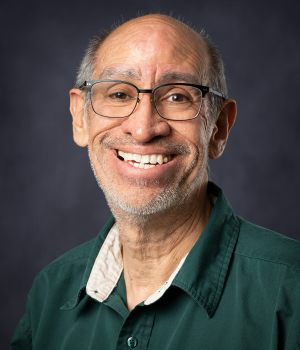

Matthew Barlow
Title: Department Chair, Professor of Physiology
Office Location: RSC 256
Phone: 575.562.2543
Education
Doctorate of Philosophy (Integrative Physiology)
January 2006-December 2008 University of North Texas Health Science
Masters of Biomedical Science
August 2002-May 2005 University of North Texas Health Science
Bachelor of Science in Biology
1994-1999 University of New Mexico
Bio
Dr. Barlow is an Associate Professor in the Department of Biology. He is an integrative physiologist in the Department of Biology, and teaches the following courses: Human Anatomy and Physiology (BIOL 2110 and 2225), Endocrinology (BIOL 380), Neurobiology (BIOL 433), Advanced Human Physiology (BIOL 424), and special topic courses in Advanced Cardiovascular Exercise Physiology and Molecular and Cellular Exercise Physiology. Dr. Barlow is also the Department of Biology Graduate Coordinator and director of the Human Anatomy Cadaver lab.
Research Interests
Dr. Barlow?s laboratory research deals with the cardiovascular health disparities in diabetes and metabolic syndrome in the regional Native American and Hispanic populations. His lab studies the control of heart and skeletal muscle blood flow associated with changes in aging, metabolism and exercise training. He also has studies in nutritional supplementation with exercise performance. Prior studies in the laboratory have included dual task post-concussion neurocognitive and physiological evaluation of young athletes as well as opioid regulation of the autonomic nervous system in pre-and post-conditioning of the heart.


Patricia Cabrales Arellano
Title: Assistant Professor of Molecular Biology
Office Location: RSC 247
Phone: 575.562.2495


Drew Davis
Title: Assistant Professor of Herpetology, Gennaro Natural History Museum Director
Office Location: RSC 258
Phone: 575.562.2723
Education
Ph.D., Biological Sciences; University of South Dakota
M.S., Population and Conservation Biology; Texas State University
B.S., Biology (Ecology, Evolution, Behavior); The University of Texas at Austin
Bio
My role in the Department of Biology serves as a vertebrate zoologist and wildlife biologist. I teach courses such as Wildlife Biology (BIOL 1650), Wildlife Management and Conservation (BIOL 405/505), Herpetology (BIOL 411/511), and Conservation Biology (BIOL 513). I also hold the title of Director of the Gennaro Natural History Museum, located in the Roosevelt Science Center.
Research Interests
My research focuses on the ecology and conservation of amphibians and reptiles across North America, particularly throughout the southwestern and midwestern United States. I have conducted studies involving emerging technologies (environmental DNA, drones), behavioral ecology, stress physiology, disease ecology, ecotoxicology, and natural history to gain a deeper insight into threats and challenges species and populations face, with the goal of conserving both species and critical habitat. In addition to field- and laboratory-based studies, I also utilize museum collections and specimen-based research to further our understanding of amphibian and reptile ecology and taxonomy. Recently funded projects include:
4. Increasing our understanding of the Rio Grande Cooter to inform future recovery options (2024-2027) (funded through the National Fish and Wildlife Foundation)
3. Using environmental DNA (eDNA) to survey for imperiled reptiles in New Mexico (2024-2027) (funded through the New Mexico Department of Game and Fish)
2. Assessing the distribution and conservation status of imperiled aquatic turtles in southwestern Indiana (2023-2027) (funded through the Indiana Department of Natural Resources)
1. Validating a distribution model for the Western Ribbonsnake in New Mexico (2023-2026) (funded through the New Mexico Department of Game and Fish)
Learn more at: https://drewrdavis.com/



Corey Green
Title: Assistant Professor of Environmental Toxicology
Office Location: RSC 242
Phone: 575.562.2397
Education
B.S. - Northern Michigan University
M.S. - Sam Houston State University
Ph.D. - University of North Texas
Bio
My research interests are multidisciplinary and synthesizes basic biology, behavior, ecology, and biochemistry to create an in-depth narrative on the negative effects of contaminants to both human and environmental health. Within the lab, I use animal models commonly utilized in the assessment of human disease to study mechanisms of toxicity and their impacts on physiology, abiotic stress response, and complex behaviors in an effort to answer questions on conservation and health. In the field, I study a variety of systems and organisms up to the community level to better understand the impacts of contaminants on ecosystem health, contaminant cycling, and remediation.
My current research projects vary from contaminant effects at the sub-cellular level to ecosystem and community structure. Currently funded projects include;
Mechanisms of neurotoxicity in zebrafish exposed to polychlorinated biphenyls, with specific interest in the role of intracellular calcium homeostasis.
Metals contamination in freshwater systems after wildfire and the role of beaver ponds in mitigating these effects at the community level, using macroinvertebrate community structure as an environmental health indicator.
How cover crops can be utilized for heavy metal remediation in severe wildfire affected regions, with interest in industrial hemp in addition to more traditional species.
The effects of PFAS exposure on the microbiome of Blue Gill fish and how these affect the gut-brain-axis, using microbiome, transcriptomic, and metabolomic techniques to characterize these effects.
Assessing the physiological consequences of zebrafish population level developed resistance to organic contaminants.
Current distribution of the Rio Grande Cooter within the lower Pecos River watershed, tolerance of abiotic stressors, environmental assessment of current range including contaminant loading, and modeling of favorable habitat for conservation.


Michelle Hughes
Title: Instructor of Biology
Office Location: RSC 251
Phone: 575.562.4048


Darren Pollock
Title: Professor of Entomology
Office Location: RSC 248
Phone: 575.562.2862
Education
Ph.D. University of Alberta 1994
M.Sc. University of Manitoba 1988
B.S.A. University of Manitoba 1985
Bio
I am the invertebrate zoologist in the Department of Biology, and I teach the following courses: General Biology I (BIOL 154), General Biology II (BIOL 155), Invertebrate Zoology (BIOL 300/L), General Entomology (BIOL 301/L), Parasitology (BIOL 341/L), Evolution and Systematics (BIOL 305), Biological Literature (BIOL 582), and Evolution (BIOL 562). I am also the head curator of collections, and curator of invertebrates, of the ENMU "Dr. Antonio 'Tony' Genaro Natural History Museum".
Research Interests
My research deals with the taxonomy, ecology, systematics, and biogeography of insects, specifically beetles of the large superfamily Tenebrionoidea and (recently begun) robber flies of the family Asilidae. My beetle work involves a combination of larval and adult morphological characters to elucidate phylogenies and classifications of taxa of interest. For the robber flies, I?m interested in prey selection, as well as basic, alpha-level taxonomy. I would not, however, restrict graduate students to work on these particular insects; students are encouraged to work on a taxon of their own interest.
At present, my research is collection-based, and involves use of external characters of larvae, pupae and adults. Because the beetle families on which I work are fairly small, I can work at the world level, and include all known taxa; this gives a very complete evolutionary picture of these beetle families. For robber flies, I?m most interested in fully documenting the local, i.e. eastern New Mexico, biodiversity. I am also interested in general biodiversity, specifically the role that systematists play in documenting the world's invertebrate fauna.


Carl Schmitt
Title: Assistant Professor of Ornithology, Gennaro Natural History Museum Curator
Office Location: RSC 243
Phone: 575.562.2753


Perinthottathil Sreejith
Title: Assistant Professor of Genetics
Office Location: RSC 245
Phone: 575.562.2078
Bio
We are a dynamic research team passionate about unraveling the intricate mechanisms that govern gene regulation, metabolism, and evolution. Using cutting-edge approaches in genetics, molecular biology, and bioinformatics, we explore fundamental biological questions with broad implications for health and disease.
Research Focus:
? Post-Transcriptional Regulation in Stem Cells
How do RNA-binding proteins (RBPs) control gene expression in intestinal stem cells? Using Drosophila as a powerful genetic model, we investigate how post-transcriptional regulation?including mRNA stability, splicing, and translation?shapes stem cell behavior, tissue regeneration, and homeostasis. Our work could reveal new insights into regenerative medicine and gastrointestinal disorders.
⚖ Lipids and Sexual Dimorphism
Why do males and females exhibit differences in metabolism, lifespan, and disease susceptibility? We study how lipid metabolism contributes to sex-specific traits, exploring the interplay between diet, hormones, and gene expression. By understanding these mechanisms, we aim to uncover how metabolic pathways differ between sexes and their implications for health.
? Genetic Diversity of Aedes Mosquitoes
Mosquitoes are not just pests?they are vectors of deadly diseases like dengue, Zika, and chikungunya. We investigate the genetic diversity and adaptive evolution of Aedes mosquitoes to understand how they develop insecticide resistance, adapt to new environments, and spread disease. Our research contributes to better mosquito control strategies and public health interventions.
visit us at: https://labofmolgen.wixsite.com/mysite


Manuel Varela
Title: Professor of Biology
Office Location: RSC 254
Phone: 575.562.2464
Website: https://enmu.academia.edu/MVarela
Education
Postdoctoral Fellow, 1994-1997, Harvard Medical School - under Thomas H. Wilson, Microbial Physiology
Ph.D., 1994, University of New Mexico - under Jeffrey K. Griffith
Biomedical Sciences - Biochemistry & Molecular Biology
M.S., 1989, University of New Mexico, Biomedical Sciences
B.A., 1987, University of New Mexico, Biochemistry
Bio
Varela has a Ph.D. with honors in biomedical sciences from UNM and was a postdoc under Tom Wilson at Harvard Medical School. Varela moved to ENMU and studied bacterial sugar transporters, drug resistance, and multidrug efflux pumps from MRSA and Vibrio cholerae. He used comparative genomics to identify novel antimicrobial targets in cholera-causing bacteria. The Varela laboratory has studied the modulation of antimicrobial efflux. Varela has published numerous primary papers, invited reviews, book chapters, and books, including "The Inventions and Discoveries of the World's Most Famous Scientists" in 2018, "Enter the World of Microbiology: Interviews about the World's Most Famous Microbiologists" (2019), "An Overview of Biomedical Scientists and Their Discoveries" (2020), "Biochemistry and Biochemists: Who Were They and What Did They Discover?" (2020), "The World of Molecular Biology" (2021), "The Life and Times of the World's Most Famous Female Scientists" (2022), and "The Most Influential Scientists Who Changed the World" (2024).
Research Interests
The Varela research laboratory is interested in molecular microbial physiology of bacterial resistance to antimicrobial agents. We study bacterial multidrug efflux pumps from the major facilitator superfamily of solute transporters. Our laboratory discovered the multi-drug efflux pumps LmrS from Staphylococcus aureus and EmrD-3 from Vibrio cholerae. We also collaboratively determined the complete genome sequence of a non-O1 V. cholerae genome. We always want outstanding graduate students to work in our lab and complete their MS thesis.


Daniel Zion
Title: Administrative Assistant (Main Office 575.562.2174)
Office Location: RSC 113
Phone: 575.562.2936


